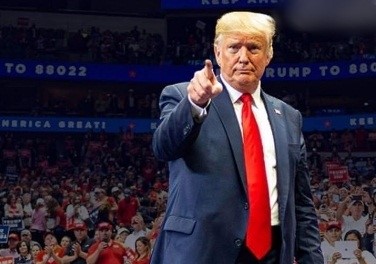The final outcome of the Illinois case and similar challenges will likely be decided by the US Supreme Court, which heard arguments related to Trump’s ballot eligibility on Feb 8…reports Asian Lite News
An Illinois state judge on Wednesday barred Donald Trump from appearing on the Illinois’ Republican presidential primary ballot because of his role in the insurrection at the US Capitol on Jan. 6, 2021, but she delayed her ruling from taking effect in light of an expected appeal by the former president.
Cook County Circuit Judge Tracie Porter sided with Illinois voters who argued that the former president should be disqualified from the state’s March 19 primary ballot and its Nov. 5 general election ballot for violating the anti-insurrection clause of the US Constitution’s 14th Amendment.
The final outcome of the Illinois case and similar challenges will likely be decided by the US Supreme Court, which heard arguments related to Trump’s ballot eligibility on Feb. 8.
Porter said she was staying her decision because she expected his appeal to Illinois’ appellate courts, and a potential ruling from the US Supreme Court.
The advocacy group Free Speech For People, which spearheaded the Illinois disqualification effort, praised the ruling as a “historic victory” in a statement.
A campaign spokesperson for Trump, the national frontrunner for the 2024 Republican nomination, said in a statement this “is an unconstitutional ruling that we will quickly appeal.”
Colorado and Maine earlier removed Trump from their state ballots after determining he is disqualified under Section 3 of the 14th Amendment to the Constitution. Both decisions are on hold while Trump appeals.
Section 3 bars from public office anyone who took an oath to support the US Constitution and then has “engaged in insurrection or rebellion against the same, or given aid or comfort to the enemies thereof.”
Trump supporters on Jan. 6, 2021, attacked police and swarmed the Capitol in a bid to prevent Congress from certifying Democrat Joe Biden’s 2020 election victory. Trump gave an incendiary speech to supporters beforehand, telling them to go to the Capitol and “fight like hell.” He then for hours did not act on requests that he urge the mob to stop.
The Supreme Court is currently weighing Trump’s challenge to his Colorado disqualification. The justices in Washington appeared skeptical of the decision during oral arguments in the case, expressing concerns about states taking sweeping actions that could affect the national election.
Earlier, the Supreme Court had agreed to hear Donald Trump’s claim that as a former president he enjoys immunity from criminal prosecution, as the 2024 White House candidate faces dozens of state and federal charges.
The court scheduled arguments in the high-stakes case for the week of April 22 and said Trump’s trial on charges of conspiring to overturn the 2020 election would remain on hold for now.
Trump had been scheduled to go on trial for election interference on March 4 but the proceedings have been frozen as his presidential immunity claim wound its way through the courts.
The Supreme Court said it would address the question of “whether and if so to what extent does a former President enjoy presidential immunity from criminal prosecution for conduct alleged to involve official acts during his tenure in office.”
It will be among the most consequential election law cases to reach the court since it halted the Florida vote recount in 2000 with Republican George W. Bush narrowly leading Democrat Al Gore.
A three-judge appeals court panel ruled earlier this month that the 77-year-old Trump has no immunity from prosecution as a former president.
Trump’s claim to be immune from criminal liability for actions he took while in the White House is “unsupported by precedent, history or the text and structure of the Constitution,” the judges said in a unanimous opinion.
“We cannot accept that the office of the Presidency places its former occupants above the law for all time thereafter,” they said.
The ruling was a major legal setback for Trump, the frontrunner for the 2024 Republican presidential nomination and the first ex-president to be criminally indicted.
The appeals court put the immunity ruling on hold to give Trump the opportunity to appeal to the Supreme Court.
Special Counsel Jack Smith filed the election conspiracy case against Trump in August and had been pushing hard for the March start date for his trial.
Lawyers for the former president have sought repeatedly to delay the trial until after the November election, when Trump could potentially have all of the federal cases against him dropped if he wins the White House again.
Trump also faces 2020 election interference charges in Georgia, and has been indicted in Florida for allegedly mishandling classified information.
He was impeached twice by the Democrat-controlled House of Representatives while in office — once for inciting an insurrection — but acquitted both times by the Senate.
The immunity case is one of two election-related cases before the Supreme Court.
ALSO READ: India, US Hold Talks to Discuss Terrorism, Money Laundering

